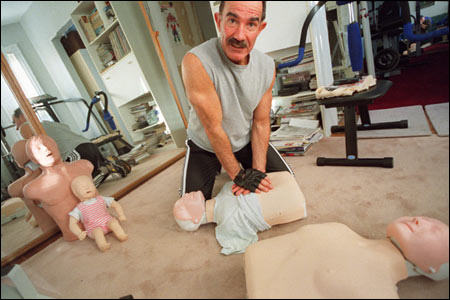The Big Picture:
Steve Dudley, personal trainer

Seven years ago, as Steve Dudley was making a career transition from psychotherapy and substance abuse counseling to personal fitness training, he would joke to his new clients: “It’s not how you feel, it’s how you look.”
Clever, yes, but that quip couldn’t be farther from the truth, says Dudley, who offers one-on-one fitness training and cardio-pulmonary resuscitation (CPR) classes through Harvard’s Center for Wellness and Health Communications.
“People should be fit because it’s the fountain of youth,” says Dudley, and a toned physique is only part of it. More energy, better mood, and the ability to fully participate in favorite activities – from playing softball to playing with one’s kids – are among the lasting benefits Dudley hails to those he trains.
Like most fitness professionals, Dudley eschews fads and quick fixes and opts for the old-fashioned road to physical well-being: three square meals and 30 minutes of cardiovascular activity per day, plus regular resistance training and flexibility work. To those who moan that they can’t peel away from their busy days to peel off the pounds, Dudley suggests scheduling fitness time (with a trainer, if necessary) like any other important appointment.
“I’ve worked with some of the busiest people in the world,” he says, including Harvard President Lawrence H. Summers. “He’s doing great. He recognizes that everybody needs some kind of regular physical activity,” says Dudley. In addition to personal training, Summers makes time for regular tennis games.
Solidly in his mid-fifties, Dudley is a running, lifting, 11-percent-body-fat advertisement for his services. At Harvard, where many of the faculty and staff he consults are middle-aged, Dudley believes his age helps him connect with his clients.
“What I notice is a bonding with people in their 30s, 40s, 50s, and on up,” he says. “I’m not right out of school, I’ve had a lot of life experience.” He draws on his long career in mental health – which included directing Mt. Auburn Hospital’s program for people arrested for drinking and driving – to keep his clients going when their own motivation flags.
“My training in psychotherapy was in behavioral change,” he says, joking that he’s traded the therapist’s couch for a weight lifter’s bench. There might be more similarities than differences, he thinks.
“I like contact with people around helping them get healthier. That’s always been my focus: working with people and helping them achieve something better physically, mentally, emotionally,” he says. “Over the years, I’ve settled on fitness training as the most satisfying way to do that.”




